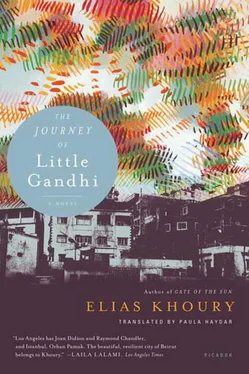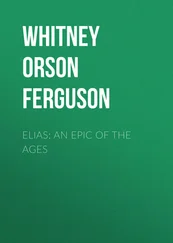It was true she lived alone, but her aloneness was not merely a series of spaces in her memory.
The second love of her life wasn’t anything like the first. His name was Abu Abbas al-Yateem.
Abu Abbas al-Yateem would sit all day long on the fishermen’s bench in the port of Ayn Mraysi wearing shorts and a short-sleeved shirt, summer and winter alike. He never changed, as if he were immune to the cold. He knew everyone. “They’re all my friends,” he said to Alice. He told her he didn’t have a job; he used to be a fisherman, but now he was nothing. He’d sit and work would come to him. He’d sit because he didn’t like work, and so work came to him on its own. Alice didn’t like him at first. He came several times to Shaheen’s and sat in the back waiting for her. When she’d finish with the other customers, she’d find him standing in front of her. “Hey, gorgeous. Let’s get out of here,” he’d say to her. Alice wouldn’t go with him; she’d look at him as though she didn’t see him and walk away. Every day she’d be greeted with the same old “Let’s get out of here,” but after a week, or a month, she couldn’t remember exactly, and that wasn’t important at any rate, she found herself with him.
Alice said when she was with him, she wasn’t really with him. He had small eyes like two lentil beans, a wide forehead, hands like two big slabs of concrete. He’d take her to his room and sit her down outside next to the bench. He’d put a basket of fruit in front of her and talk. Alice would be shivering from the cold that penetrated her bones, but he’d just sit there, motionless, as if he didn’t feel the cold at all. Then he’d take her behind the room, to a small courtyard filled with candles, and there he’d start flirting with her. The courtyard was fenced in, and the half-melted candles were all over the place, and there was the stench of urine and decay. There he’d make love to her standing up, and she wouldn’t resist him. She’d just let him go back and forth and sway like a shadow rippling in the pale lights of dawn that resembled eggplant. Then they’d go to his room and sleep.
Alice said she didn’t love him.
“Love comes later, at the end of the story. You know whether you’re in love or not at the end. In the middle of the story, you’re lost. Now I know. Tannous was all right, but this guy, al-Yateem, no. I didn’t love him. It was something else.”
That something else was the sea. Alice said he reminded her of the sea. He smelled like the sea. It was he who told her the sea was night. He’d swim in night’s sea; he’d take off his shirt and jump in, and she’d watch how he’d get lost in night’s sea. She’d stand behind the fence covered with candles and look to the sea, and she’d see night. Then when he’d come out of the water and salt, he’d make love to her again and leave her invigorated with water and unfulfilled desire.
During the day, she’d see him, surrounded by tourists and curious onlookers. He’d go to his room and get out an old notebook full of writing. He’d say the whole history of Ayn Mraysi was in that book. He’d stand in front of the cameras, pointing out to the journalists and foreigners the half-melted candles. He never tired of telling the story of the Italian nun.
The nun, he said.
The ship was sinking in the middle of the sea, he’d say, pointing to the distant horizon while people strained their eyes to see the point in the round, blue expanse. The ship sank and the nun came out of it, all by herself, everybody saw her, they saw her precious white headdress as it floated on the surface of the water. It floated as if it were a white box, and then the nun appeared. She wasn’t swimming, she was walking, I swear to God she was walking, an Italian nun walking on the water. The white headdress rose up and the nun appeared in her torn clothes, while people stood right here, and he’d point to where the candles were, the people right here, and the nun coming from there, from that distant point, as though she were walking. “I,” Abu Abbas said, “was a little boy, my father saw her, I swear on his grave, my father said she walked, and when she reached here, to the shore, people started running, one of them brought a white sheet, she wrapped herself in it and the sheet stuck to her body. She stayed here, she didn’t ask for anything. She sat right here, there was no fence here, it was all sand and cactus, she knelt by the cactus and started praying. Then she built a little hut for herself and lived among the people, she was like a ghost. People said she was educated, God only knows. She’d go up there to drink, to the spring that was there, and he’d point with his hand to no place, and no one would ask him what happened to the spring, or where it was exactly, and there she built a school, she taught the children and she memorized the Qur’an, and her name became al-Raysi, mother superior, and the name of the area changed to Ayn al-Raysi, the spring of al-Raysi, and then, through mispronunciations and time, changed to Ayn Mraysi.”
All this was written in the book. This is it, the book I inherited from my father, you can read it yourself. He’d put the book away and stand in front of the candles and smile.
And these candles, you forgot the candles, he’d say. These were from votive offerings, until now, people come and light candles for al-Raysi, who died here, and was buried here. Most of the people who come here are women, they get down on their knees and pray to al-Raysi and light candles, and she grants them what they pray for.
Abu Abbas told his story every day, and Alice never believed a word of it.
“You’re a world-class swindler,” she said to him.
“I’m a swindler, that’s what they want. They want information. Ever since this became a bar area there’s been a need for a history, they all want to know the history. What is history? Miracles and strange happenings, since the time of Saint Adam, peace be upon his soul, history is miracles and strange events.”
“But you’re lying to them.”
“If I lie, they believe me, and if I don’t lie, they don’t believe me. But I don’t lie; I say what I’ve heard, and what I’ve heard is true, because I heard it, right?”
“Of course not. Tell me, what was the nun’s name?” Alice asked.
“Al-Raysi, everyone knows that.”
“Right,” said Alice.
Abu Abbas made a living from the story of al-Raysi, and, people said, from dealing hashish. Once he told Alice he was always out to make easy money. “The only way to make easy money is with hashish.”
Alice didn’t love him. She’d go with him almost every day, she’d give him money, but she didn’t love him. Then, when he stopped coming to Shaheen’s nightclub, she didn’t feel anything at all, as if he never existed, she said. Alice didn’t remember the candles of al-Raysi, except when al-Askary was killed. That day she ran to the fence and kneeled in front of the candles, lit a candle and cried. She prayed with all her heart for al-Askary not to die and made a vow to the Italian nun. She saw him before her, dead, but she didn’t believe al-Askary could die. She lit three candles and cried, and when she went out from behind the fence she saw Abu Abbas. He pointed to her with his hand from the distance as if he didn’t recognize her. She nodded her head to him. She nodded her head and worried the precious white headdress would fall. She walked slowly, as if the white sheet were glued to her body and prevented her from moving.
Zaylaa was different, Alice said. He was nothing like al-Askary. “Al-Askary was the biggest barhopper in town, what a guy.”
When she described him, she became lost in a fog emanating from her eyes, she drowned in tears that wouldn’t fall, tears that surrounded her face like a halo of water. Alice didn’t expect to die. It was 1974, and Alice was staggering on her journey, and was almost collapsing under life’s blows. She was forty-seven, lived alone in her room in Ayn Mraysi, and worked at the Blow Up nightclub. There she found only al-Askary. The bar owner told her she was getting old and should retire, so she went to Kamal al-Askary and told him. He had a lot of influence. A young, dark man, tall, broad shoulders, eyebrows so thin they looked like they’d been drawn with a pencil, he walked giving the impression that his legs moved by themselves and his body followed. He was the king. He’d go to all the bars, drink whatever he wanted, all the girls were at his beck and call, and he never paid. The beginning of every month he collected from everyone. No one complained. He protected the poor and helped them out, and he’d say he never touched alcohol, even though he drank a lot and never got drunk.
Читать дальше












